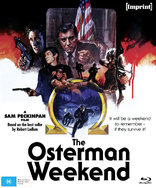The Osterman Weekend Blu-ray Movie
HomeThe Osterman Weekend Blu-ray Movie 
Imprint #109Imprint | 1983 | 1 Movie, 2 Cuts | 107 min | Rated ACB: M | Apr 06, 2022
Movie rating
6.3 | / 10 |
Blu-ray rating
| Users | 4.5 | |
| Reviewer | 4.0 | |
| Overall | 4.0 |
Overview
The Osterman Weekend (1983)
The host of an investigative news show is convinced by the CIA that the friends he has invited to a weekend in the country are engaged in a conspiracy that threatens national security in this adaptation of the Robert Ludlum novel.
Starring: Rutger Hauer, John Hurt, Craig T. Nelson, Dennis Hopper, Chris SarandonDirector: Sam Peckinpah
| Thriller | Uncertain |
| Crime | Uncertain |
| Drama | Uncertain |
| Action | Uncertain |
Specifications
Video
Video codec: MPEG-4 AVC
Video resolution: 1080p
Aspect ratio: 1.56:1, 1.78:1
Original aspect ratio: 1.85:1
Audio
English: LPCM 2.0 Mono (48kHz, 24-bit)
Subtitles
English SDH
Discs
Blu-ray Disc
Two-disc set (2 BDs)
Playback
Region free
Review
Rating summary
| Movie | 3.5 | |
| Video | 3.0 | |
| Audio | 3.5 | |
| Extras | 5.0 | |
| Overall | 4.0 |
The Osterman Weekend Blu-ray Movie Review
Reviewed by Dr. Svet Atanasov April 28, 2022Sam Peckinpah's "The Osterman Weekend" (1983) arrives on Blu-ray courtesy of Via Vision Entertainment. The supplemental features on the disc include exclusive new audio commentary recorded by Mike Siegel; new program on the reconstruction and transfer of the Director's Cut of the film; archival documentaries; vintage promotional materials; and a lot more. In English, with optional English SDH subtitles for the main feature. Region-Free.
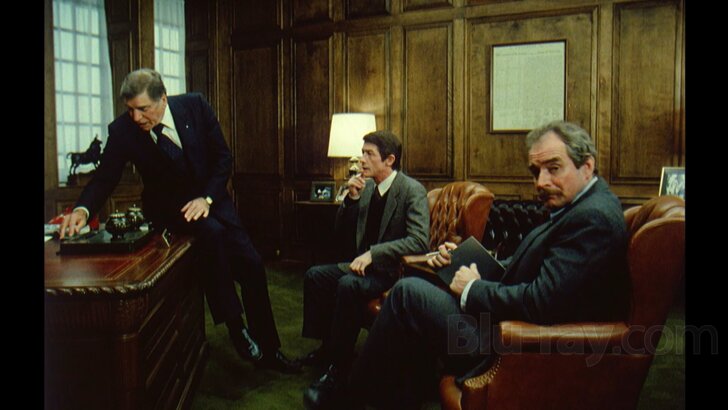
The job planners
If you compare the two versions of The Osterman Weekend that are included on this release, you will inevitably come to the same conclusion everyone else has: they are very, very different. In fact, they have such drastically different personalities that it routinely looks like much of the footage in them was shot by two completely different directors. Also, both versions very clearly mishandle the original material from Robert Ludlumís popular novel, but in different ways.
The Osterman Weekend was the final film Sam Peckinpah directed and he shot all of the footage in these versions, so the obvious question that needs to be asked is this: why are they so different?
Peckinpah became addicted to alcohol and drugs early in his career, but it took some time before the quality of his work began suffering. Despite his very bad habits, for a while, Peckinpah also managed to maintain good health. By the time the offer for The Osterman Weekend came along, however, Peckinpah was already seriously ill and weak, unable to do long hours of work, so when production was initiated he routinely struggled with his duties. On top of this, while under the influence he often changed his mind and further complicated the work that was being done to finish The Osterman Weekend on time. A complete version of the film was delivered without a delay, but after it failed to meet the expectations of top studio execs Peckinpah was asked to re-edit it. Peckinpah not only refused to touch it again but engaged in public drama with the studio execs which effectively ended any chances of him directing another feature film again. So, it would appear that at least as far as the editing is concerned one of the existing two versions better reflects Peckinpahís vision of what The Osterman Weekend should have looked like. On this release, this version is identified as the Director's Cut.
But here's something very interesting and very important about the Directorís Cut of The Osterman Weekend that you will rarely if ever, see mentioned -- it is the less coherent of the two versions, both in terms of narrative construction and stylization. Why is that? The most obvious answer appears to be that Peckinpah actually wanted The Osterman Weekend to be a uniquely fluid film capable of forcing its audience to consider scenarios that could not make sense in a conventional thriller. However, if the most obvious answer is the correct answer as well, then it means that Peckinpah never intended to deliver a proper cinematic adaptation of Ludlumís novel. The other possible answer is that Peckinpah never had a good grasp of the original material from Ludlumís novel and essentially mishandled the entire project, just as some of the studio execs that were unhappy with his final version of the film had concluded.
The truth about the Director's Cut is that it does work, but not as most people expect, and certainly not as a faithful cinematic adaptation of Ludlum's novel. As it is reconstructed by Peckinpah, the drama in it looks oddly chaotic but also thought-provoking in an unexpectedly contemporary way because it reveals deeply irrational performers in what ultimately turns out to be a very carefully staged kabuki theater. In Ludlum's novel, all of these performers are old-fashioned rational characters that are sucked into the drama for entirely logical reasons. They remain in control of it for as long as possible, too. In the Director's Cut, Peckinpah not only alters their character arcs but switches the angle from which the audience is invited to observe them. The kabuki theater begins immediately after CIA director Maxwell Danforth (Burt Lancaster) asks special agent Lawrence Fassett (John Hurt) to do a job -- infiltrate and deactivate Omega, a Soviet spy ring operating in the United States. A decision is made to use outspoken investigative journalist John Tanner (Rutger Hauer), who is planning to have a weekend party at his place with three colleagues -- Bernard Osterman (Craig T. Nelson), Richard Tremayne (Dennis Hopper), and Joseph Cardone (Chris Sarandon) -- all top members of Omega. Shortly after Tanner is approached by Fassett and his place is set up with surveillance equipment, however, the former begins to connect seemingly random dots that reveal to him a much different job than the one that has been described to him.
The paranoia that permeates the Directorís Cut also isnít identical to the one Ludlum describes in his novel. It is more unhinged, plus the characters Peckinpah introduces all turn out to be psychopaths with delusions of grandeur. Oddly, even Hauerís investigative journalist, who is supposed to be the one character with a properly functioning head on his shoulders, undergoes a pretty bizarre transformation in the final third of the film. If this obvious distancing from Ludlum's novel was entirely intentional, what was Peckinpah trying to convey? Could it be that he was warning of an inevitable development? It is actually quite easy to tell. What could possibly prevent unelected bureaucrats with unchecked powers at the highest echelons of government from developing a very dangerous sense of superiority and going rogue? Nothing. All they have to do to justify their actions is create a logical story that is then presented to a sympathetic party for validation.
The Osterman Weekend Blu-ray Movie, Video Quality 
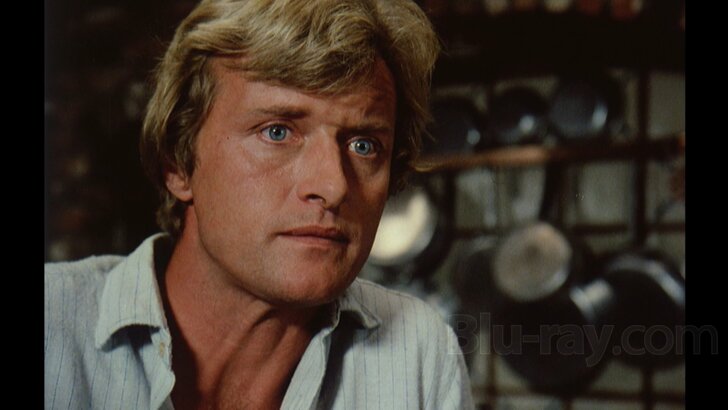
Presented in an aspect ratio of 1.57:1, encoded with MPEG-4 AVC and granted a 1080p transfer, The Osterman Weekend arrives on Blu-ray courtesy of Via Vision Entertainment.
Two sets of screencaptures are provided with our review and they appear in the following order:
Screencaptures #1-17: Director's Cut.
Screencaptures #20-26: Theatrical Cut.
I viewed the Director's Cut of the film, which is sourced from a new 2K master that was prepared by Mike Siegel in Germany. This master was sourced from a 35mm print, which was created by Sam Peckinpah's archivist, Don Hyde, in 1983.
Obviously, what we have here isn't an ideal situation. In fact, it is pretty obvious that this situation would not have even materialized had it not been for the efforts of people that truly care about The Osterman Weekend. What does this mean exactly? It means that the current presentation of the Director's Cut of The Osterman Weekend would remain the best presentation if some very serious and expensive efforts aren't initiated to fully restore it, and I personally do not think that such efforts are on the horizon. Why? Because my impression is that the Director's Cut would need a lot of serious work, including reconstructive work, to look as it should, or as most of us would like it to look on Blu-ray. To be perfectly clear, the current presentation does have fine organic qualities, but it has various limitations that make it look seriously dated as well. (To put the current situation in a proper context, compare what was done with Road Games after a 4K master was struck from a release print, which obviously isn't an ideal situation either. The Osterman Weekend does not look even remotely as good as Road Games does on Blu-ray). For example, even though occasionally delineation could be somewhat pleasing, it simply isn't of the type we have come to expect from proper 2K masters. Why? Because of various source limitations, and because additional work is needed to get optimal results from the existing elements. The same can be said about clarity and depth. Fluidity isn't particularly impressive either, though surface damage obviously causes other issues that have a significant negative impact on it as well. The color balance is a lot better than what you will see on the Theatrical Cut (see a review of the North American release here). In fact, in my opinion this is the greatest strength of the current presentation of the Director's Cut because it brings the visuals closer to where they need to be in terms of color temperature and balance. However, there is still room for substantial improvement, and darker areas in particular leave a lot of be desired because entire ranges of darker primaries, supporting nuances, and shadow nuances need to be more convincing. Image stability is fine, but there are numerous areas with minor bumps and jumps. As noted earlier, surface wear remains, so ideally the film should look a lot healthier as well. So, what is the final verdict on the current presentation of the Director's Cut of The Osterman Weekend? It is very clearly the best presentation of the film, not just this particular cut, on the market, with the most satisfying organic qualities, but in an ideal world it ought to look better on Blu-ray. (This is a Region-Free Blu-ray release. Therefore, you will be able to play it on your player regardless of your geographical location).
*On Disc Two, there is an unrestored alternative feature version of The Osterman Weekend, which was transferred in 2K by Mike Siegel. An unrestored 35mm print from the German theatrical release of the film in 1983 is the source of this presentation.
The Osterman Weekend Blu-ray Movie, Audio Quality 
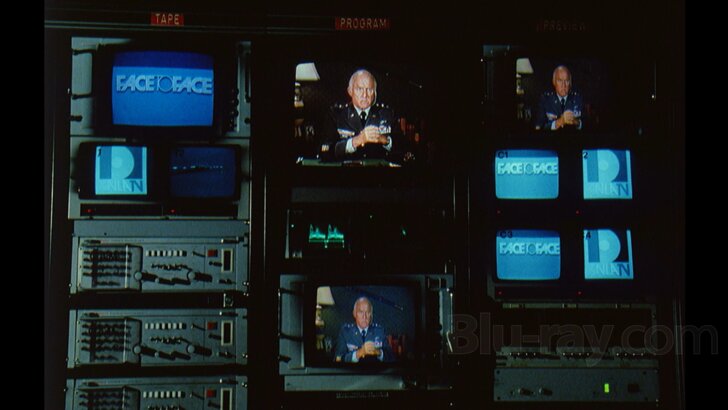
Both cuts of The Osterman Weekend can be viewed with English LPCM 2.0 tracks. Optional English SDG subtitles are provided for each as well.
Mike Siegel apparently did some extra work to get the audio synchronized and I personally did not notice any troubling issues to report in our review. In fact, I could not even tell that there were issues to begin with. On the other hand, the audio clearly needs some serious restoration work as well. Why? Because even though clarity and sharpness are satisfying, its dynamic range is pretty average. Indeed, most of the time the audio sounds very thin, even flattened, so it is virtually impossible to appreciate the native dynamic contrasts that ought to make different parts of the film more exciting. However, given the nature of the current presentation and how it was put together, I think that this is the best type of work that could have been done.
The Osterman Weekend Blu-ray Movie, Special Features and Extras 
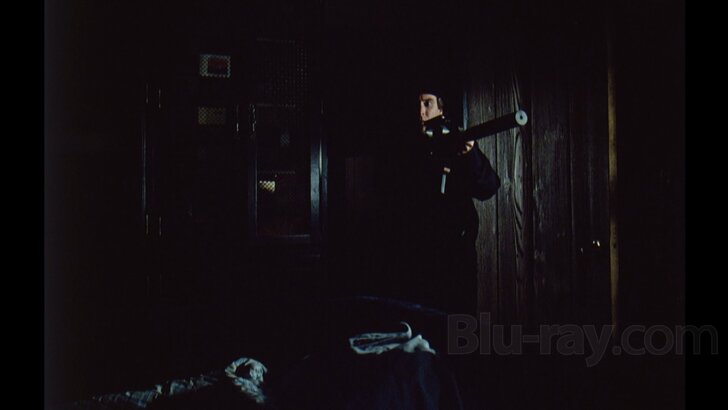
BLU-RAY DISC ONE - DIRECTOR'S CUT
- Audio Commentary - in this exclusive new audio commentary, Sam Peckinpah biographer and filmmaker Mike Siegel shares a lot of interesting information about the conception of The Osterman Weekend and the editing of the Director's Cut, some of the more substantial discrepancies between the Director's Cut and the Theatrical Cut of the film, and the reconstruction work that was required to get the Director's Cut in its current form and make it available on Blu-ray. There are also some quite interesting comments about Peckinpah's working methods, and specifically his practice of shooting without following closely a screenplay as well as his personality as a filmmaker who was never accepted by Hollywood.
- Passion & Poetry: Sam's Final Cut - in this new program, Mike Siegel discusses in great detail the reconstruction and 2K transfer of the Director's Cut of The Osterman Weekend. Included in it are clips from archival interviews with Don Hyde and Sam Peckinpah. In English, not subtitled. (39 min).
- The Two Cuts - in this new program, Mike Siegel highlights the main discrepancies between the Director's Cut and the Theatrical Cut of The Osterman Weekend. All comparisons are done with a split screen showcasing footage from both versions of the film. Original audio is used as well. (67 min).
- Filming The Osterman Weekend - a large collection of production stills, presented with music. (10 min).
- The Osterman Weekend in Pictures - a large collection vintage promotional and archival stills from The Osterman Weekend, presented with music. (10 min).
- Promoting The Osterman Weekend - a large collection of original archival promotional materials for The Osterman Weekend from around the world, presented with music. (10 min).
- Unrestored Alternative Feature Version - an unrestored presentation of The Osterman Weekend in the 1.66:1 aspect ratio transferred in 2K by Mike Siegel. An unrestored 35mm print from the German theatrical release of the film in 1983 is the source of this presentation. In English, with optional English SDH subtitles. (103 min).
- Commentary - this archival audio commentary was recorded by critics Paul Seydor, Garner Simmons, David Weddle, and Nick Redman.
- Alpha to Omega: Exposing The Osterman Weekend - this archival documentary also appeared on the North American Blu-ray release of the Theatrical Cut of The Osterman Weekend. It takes a closer look at Robert Ludlum's novel and some of the key themes in it, the troubled production history of Sam Peckinpah's film, its promotion and reception, and the iconic director's personality and working methods. Included in it are clips from interviews with producers Bill Panzer and Peter Davis, Helen Shaver, Craig T. Nelson, Chris Sarandon, and Rutger Hauer, amongst others. In English, not subtitled. (78 min).
- U.S. Theatrical Trailer - presented here is a vintage U.S. trailer for The Osterman Weekend. In English, not subtitled. (3 min).
The Osterman Weekend Blu-ray Movie, Overall Score and Recommendation 
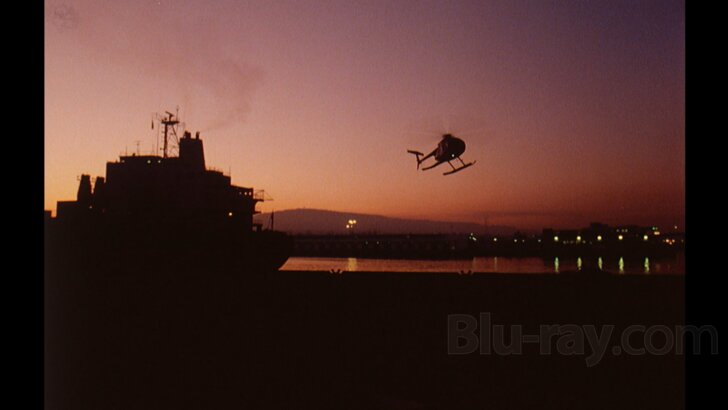
A lot of people would have had a very different take on Sam Peckinpah's The Osterman Weekend had they been able to see his Director's Cut, not the Theatrical Cut that ended up in the distribution system. Was the Director's Cut a brilliant cinematic adaptation of Robert Ludlum's novel? Absolutely not. In fact, the Director's Cut is such a fluid, often even chaotic film that it is pretty clear it was never meant to be a faithful film. What was Peckinpah trying to accomplish with it? It is impossible to tell with absolute certainty because he completed it at a time when a lot in his life was already falling apart and affecting the quality of his work, but I would go on record and say that much of the supposedly illogical and over-the-top material is purposely done to shift the audience's point of view. This essentially invalidates the old criticism that there are plenty of plot holes in it because it is no longer a conventional thriller about a complex conspiracy. Now, it is a lot like a David Cronenberg project where some seriously unhinged individuals at the highest echelons of government have developed a dangerous sense of superiority and gone rogue. If deconstructed as such a project, the Director's Cut gets a lot of things right, including scenarios that have appeared in the modern news cycles. This recent two-disc set is very clearly a labor of love and could turn out to be the final such release of The Osterman Weekend we see on the market. Kudos to the folks at Via Vision Entertainment and Mike Siegel for doing all the hard work that was obviously required during the Covid pandemic to produce it. HIGHLY RECOMMENDED.
Other editions
The Osterman Weekend: Other Editions
Similar titles
Similar titles you might also like

The Killer Elite
Imprint #192
1975

Dying of the Light
2014

The Ipcress File
1965

White Lightning
1973

In the Land of Saints and Sinners
2023

Ransom
The Terrorists
1974

American Assassin 4K
2017

The November Man
2014

Spy Game
2001

Red Hill
2010

High Plains Drifter
40th Anniversary Edition
1973

F/X
1986

Crimson Tide
1995

The Sum of All Fears 4K
2002

Patriot Games
1992

Shooter
2007

The Gunman
2015

The Night Manager
2016

Blue Thunder
1983

One-Eyed Jacks
1961
